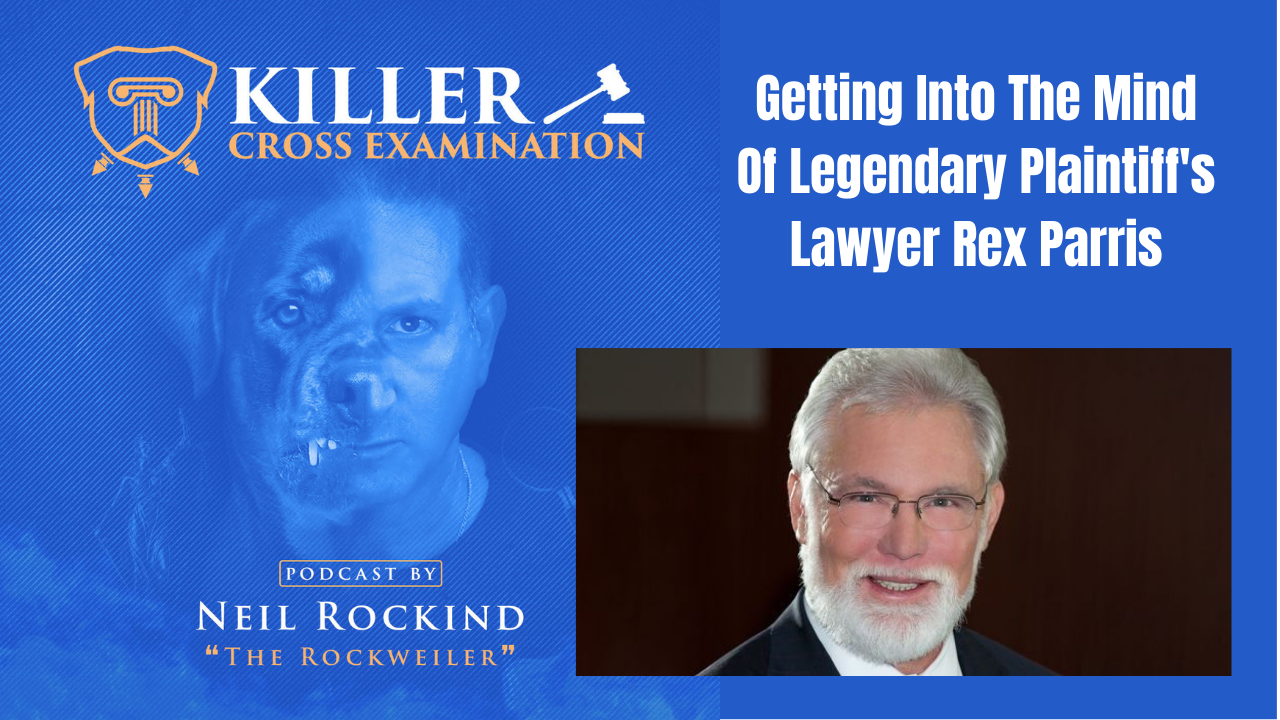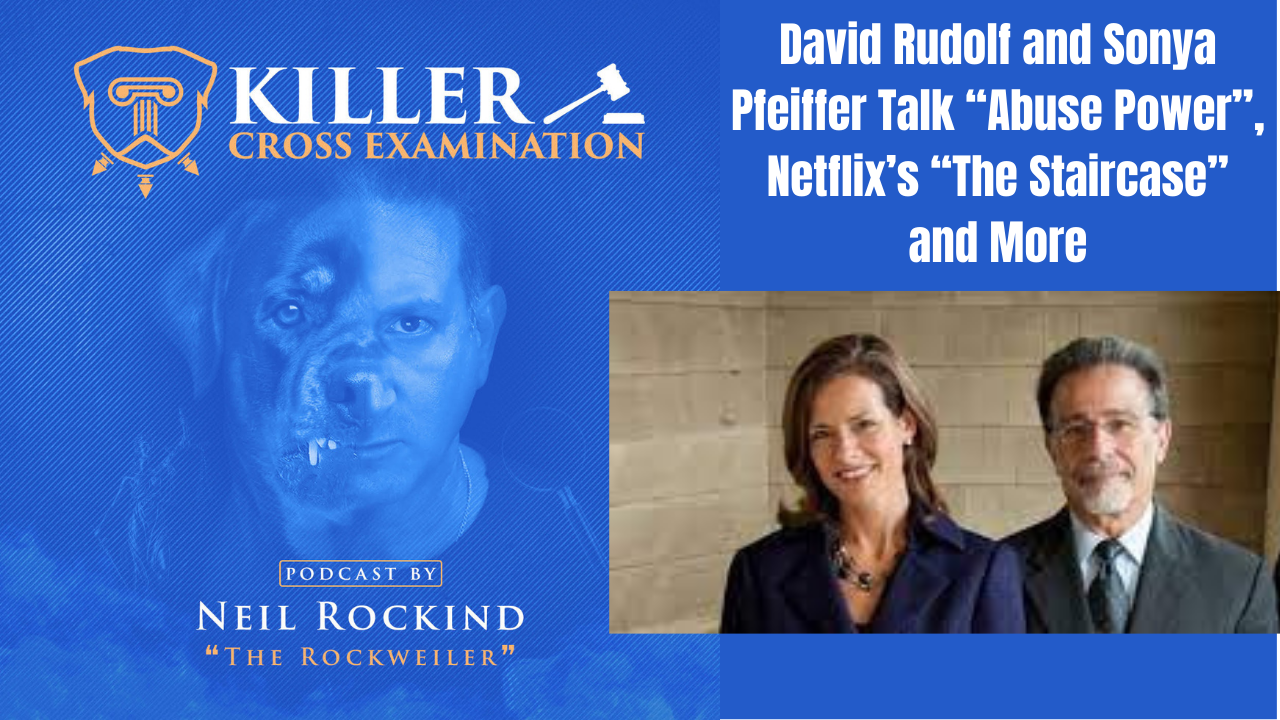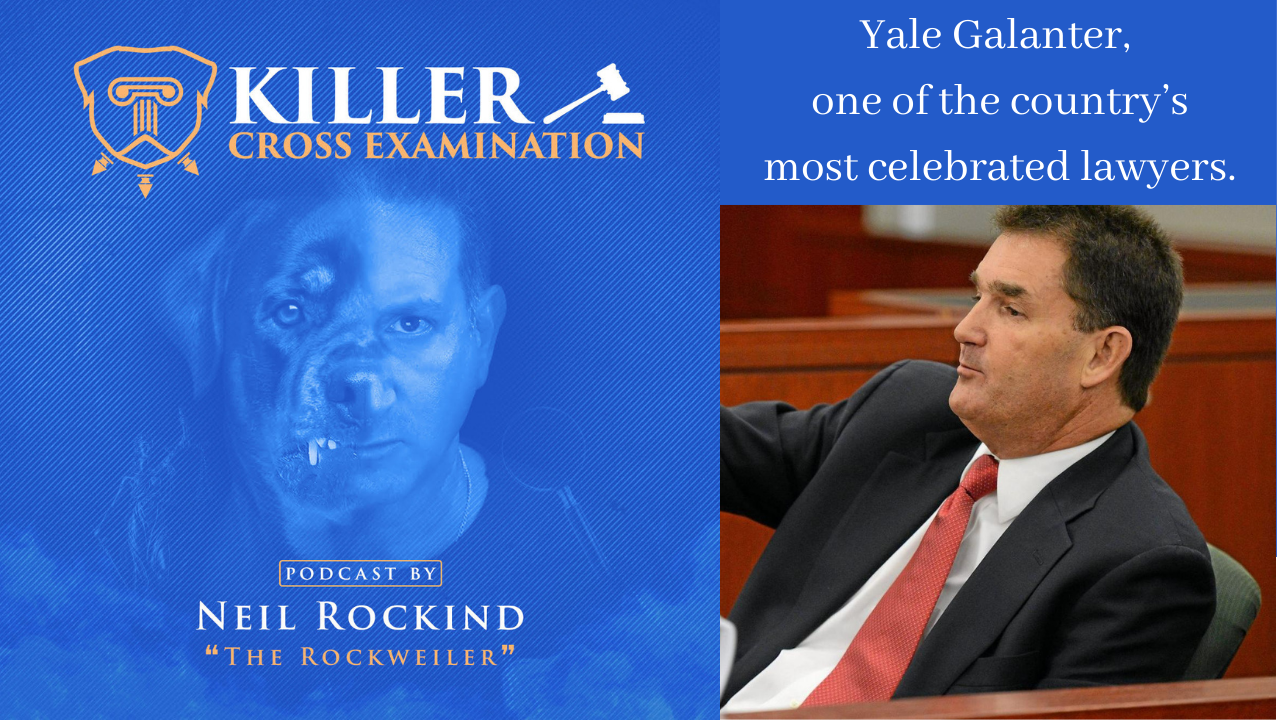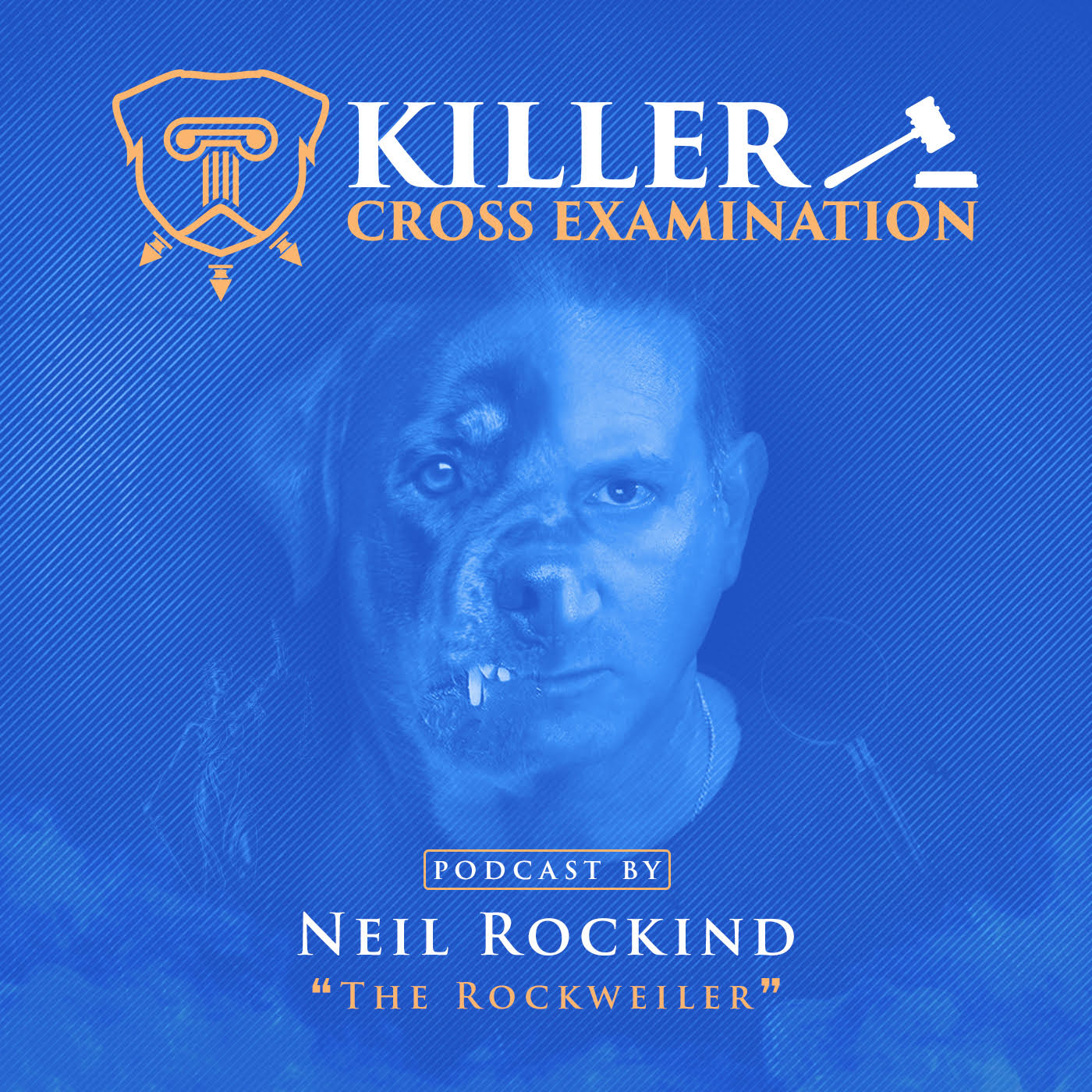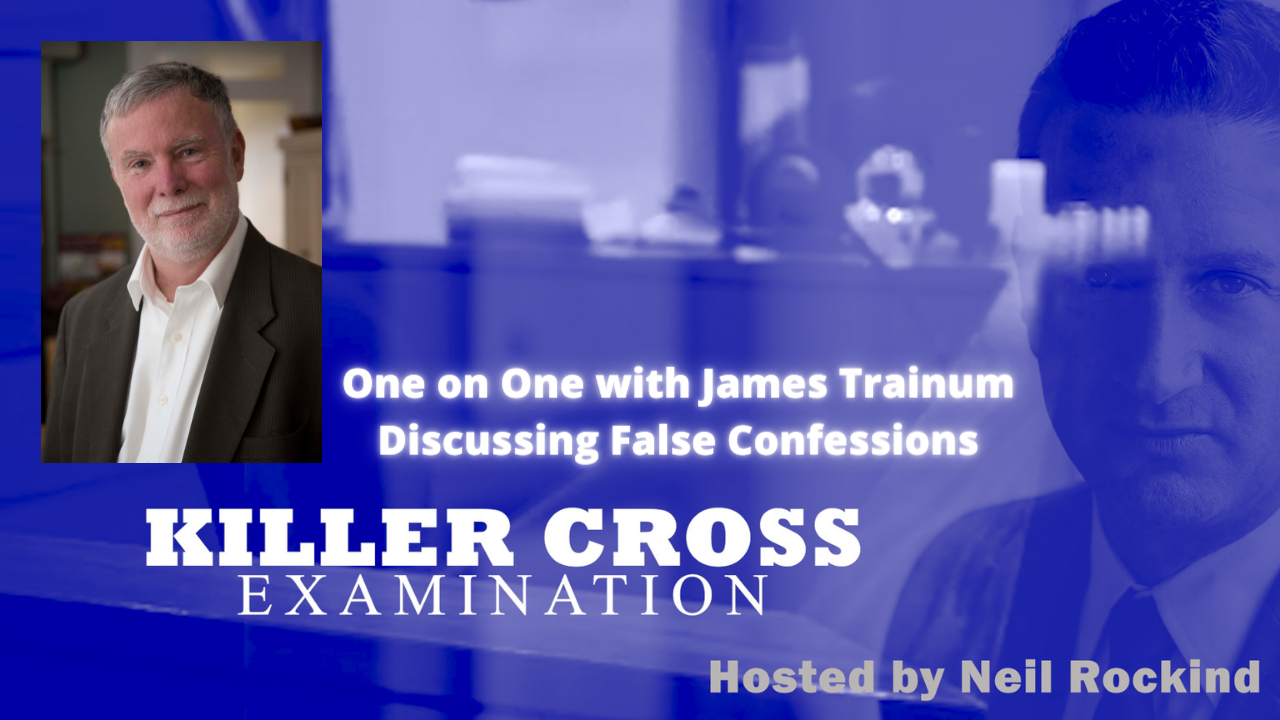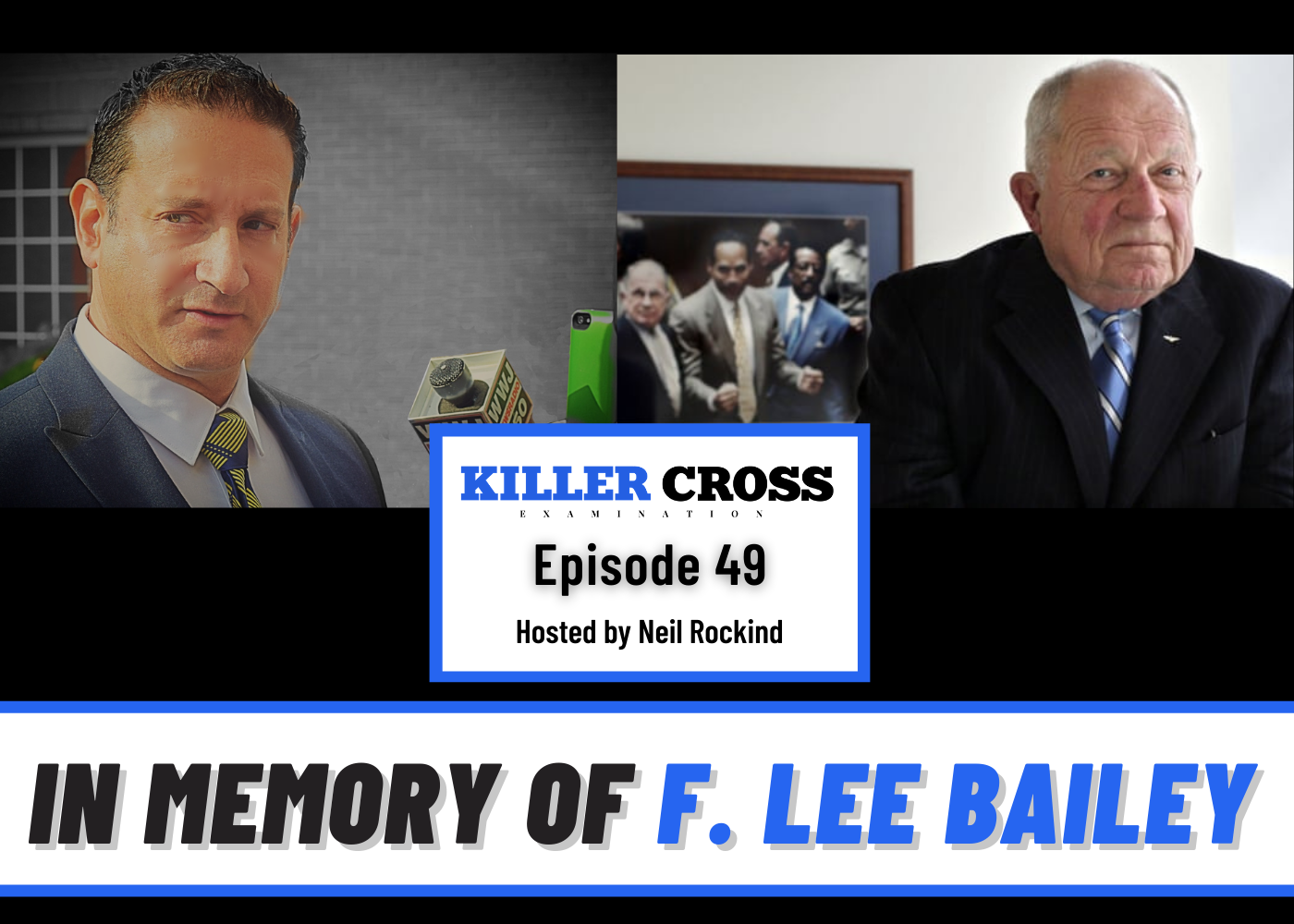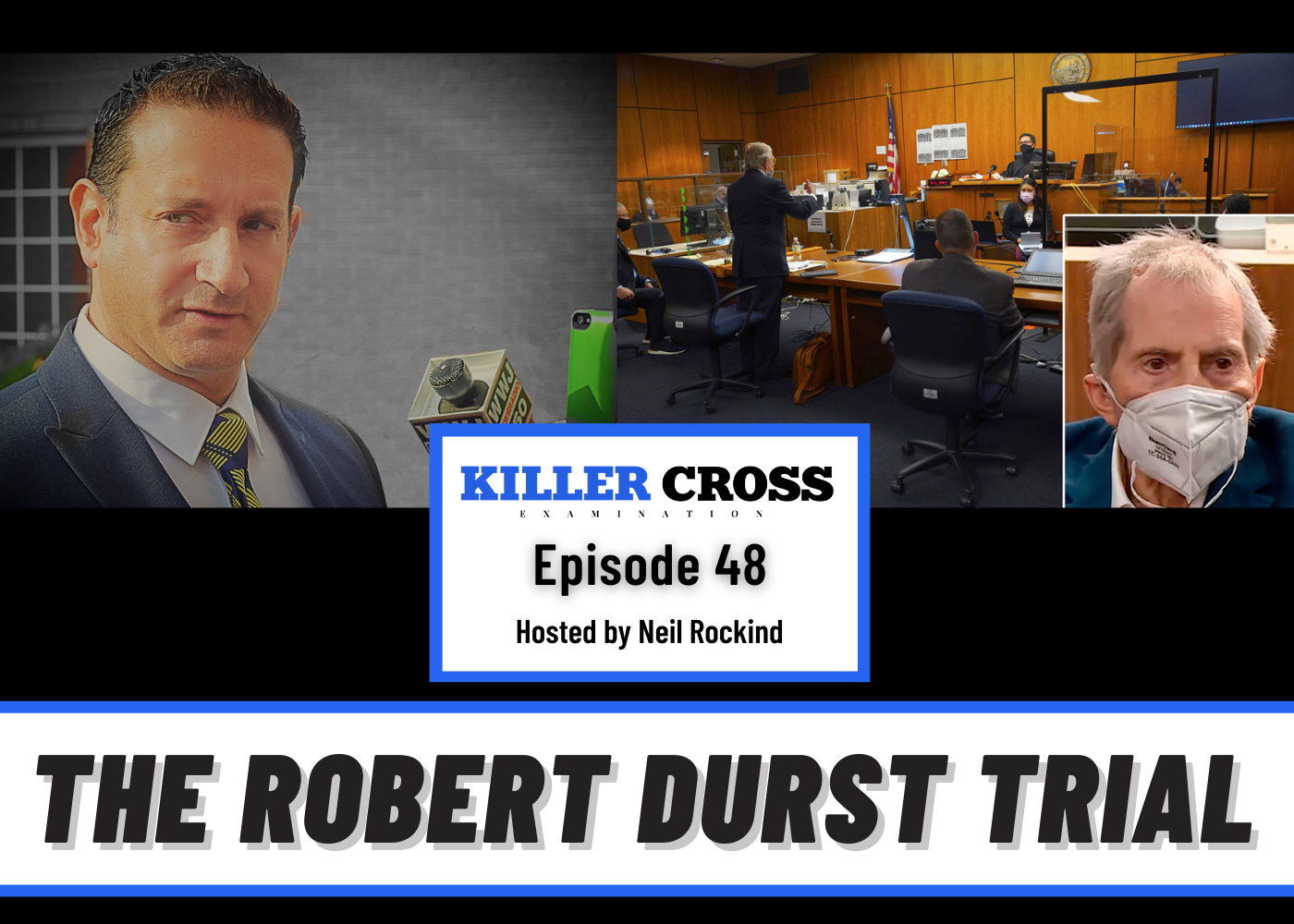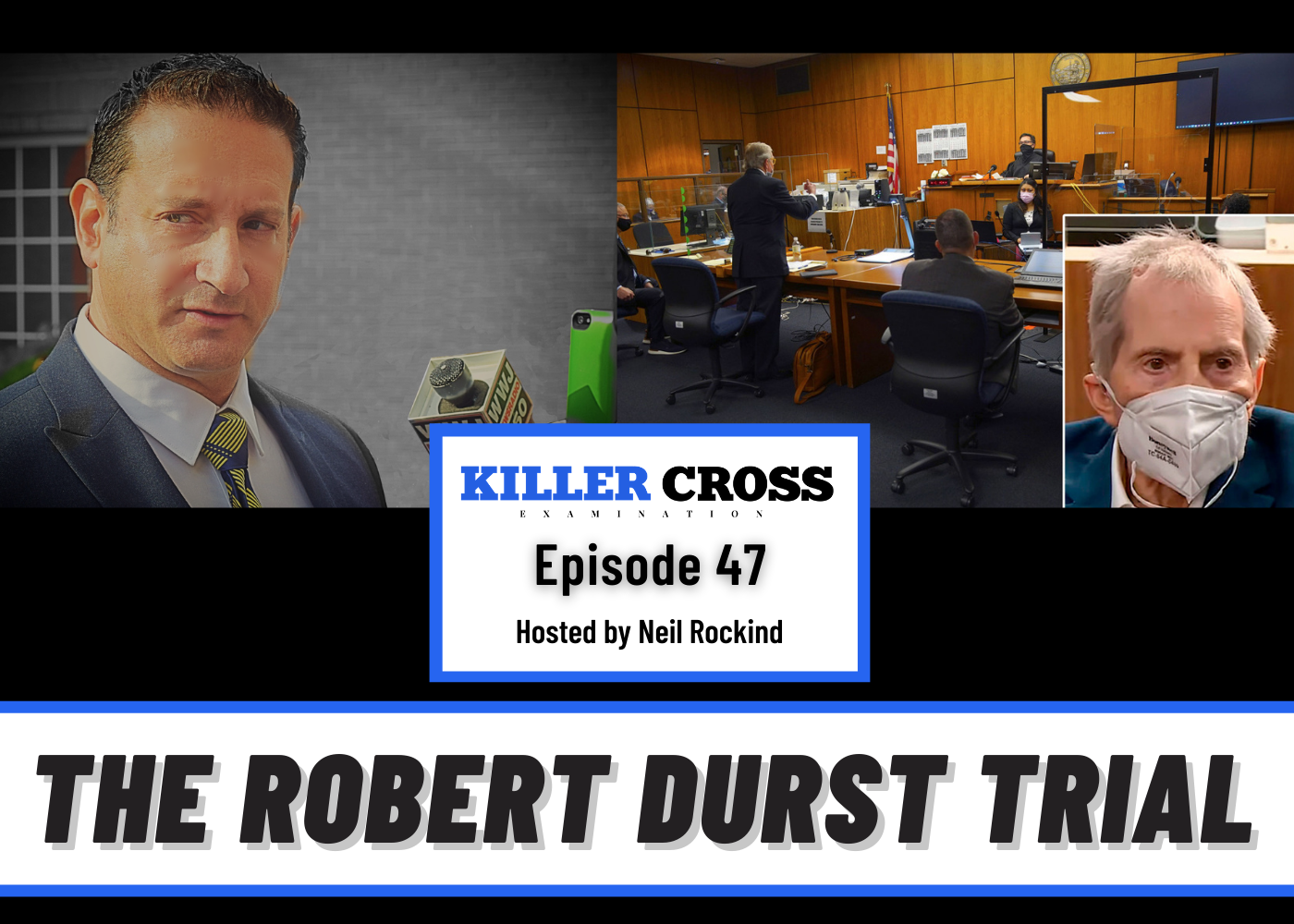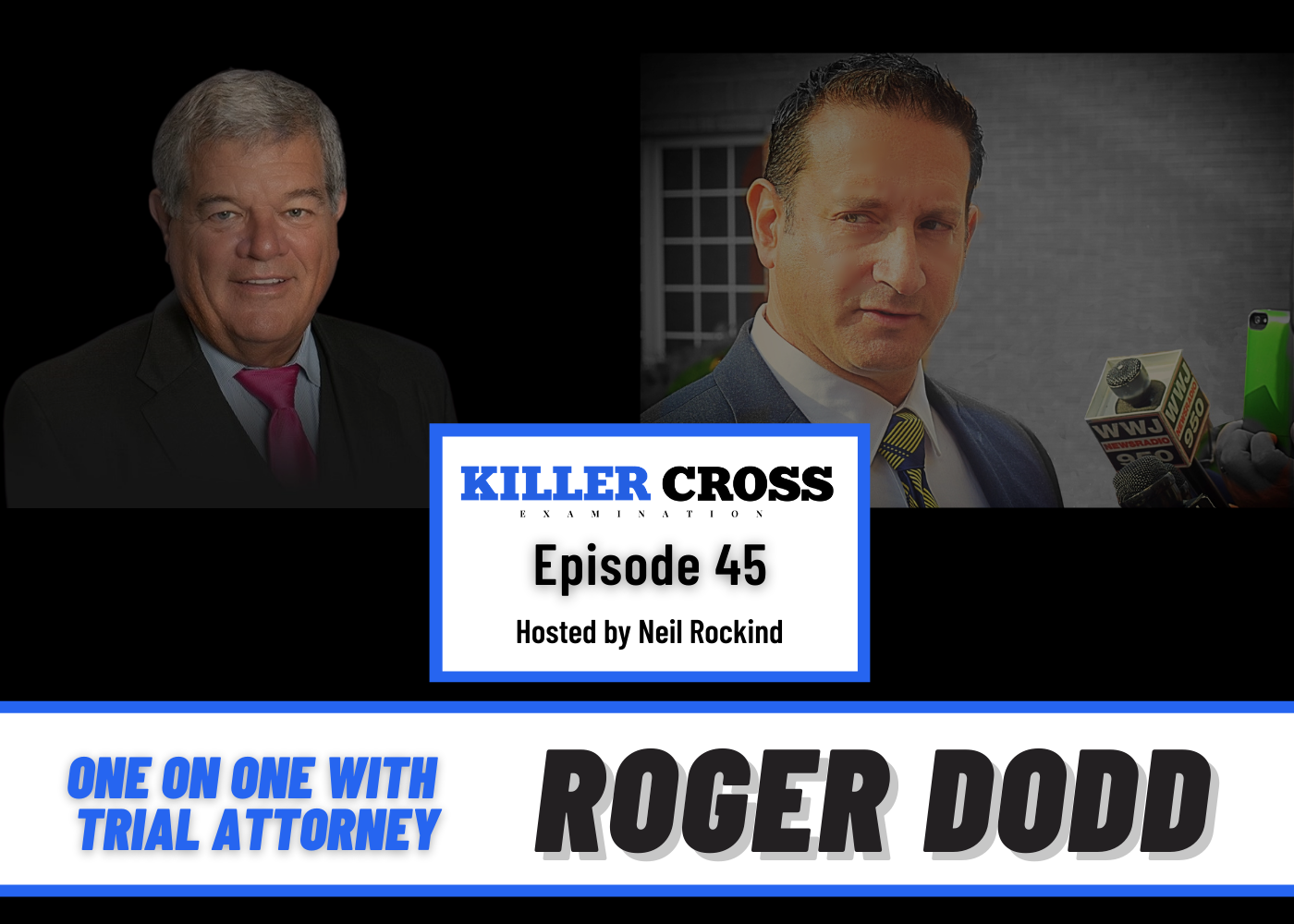Blog
David Rudolf and Sonya Pfeiffer Talk “Abuse Power”, Netflix’s “The Staircase” and More
Few lawyers have tried 1 high profile case on TV, let alone two – and one that was covered by Netflix! Want to get behind the scenes of The Staircase, the Netflix documentary series about the prosecution and defense of novelist Michael Peterson who was charged with murder? Did you know his lawyer, David Rudolf, also defended NFL star Rae Carruth in a capital case? Rudolf is a legendary lawyer who now practices with his wife, Sonya Pfeiffer, and they host a podcast called Abuse of Power. I’ve got em both on Killer Cross Examination.
Meet Yale Galanter, One Of The Country’s Most Celebrated Lawyers
Want to know what Charlie Sheen, Brooke Mueller and OJ Simpson have in common? Want to know how to win trials? Pick a jury with OJ Simpson as your client AFTER he was acquitted of a double murder? Get behind the scenes at Court TV with someone who knows Nancy Grace and who knew Johnnie Cochran? Meet Yale Galanter, one of the country’s most celebrated lawyers. He’s my guest on the Killer Cross Examination Podcast.
My Continued Breakdown of the Robert Durst Murder Trial
Episode 50: One on One with James Trainum Discussing False Confessions
One on One with James Trainum, an Expert in Police Interrogation Tactics and False Confessions
False confessions occur and they are much more commonplace than people believe or are willing to admit. Many scoff at the notion that someone would or could admit to a crime they didn’t commit. But it happens and happens regularly. According to the Innocence Project, 25% of all wrongful convictions involve a false confession. That is a staggering number – ¼ of all wrongful convictions involve a false confession and those figures don’t include the cases in which the accused falsely confessed but who ended up being charged but not convicted, charged but whose case was dismissed and who were investigated but never charged. This is too important a subject to ignore and so in this episode, I go one on one with an expert in police interrogation tactics who himself participated in obtaining a false confession and has since spent his career trying to figure out and why that false confessions occurred, how they occur in general and how to put a stop to the practices that lead to them. James Trainum, a former detective with the Washington D.C. Police Department, is my guest.
No one is perhaps more qualified to speak on the subject. Trainum spent 27 years with a spolice officer with the majority of that time as a detective. He investigated major cases, cold cases, and homicides. Trainum is an expert in the police interrogation tactics and written extensively, consulted on and even testified about the police interrogation tactics and one method in particular, The Reid Technique. He has written extensively on the subject and was one of those chosen by the Department of Justice to review the New Orleans Police Department’s interrogation practices and to report a report about them. He has appeared in/on NPR, the New Yorker magazine, The New York Times, 48 Hours, USA Today and Netflix on the series about Confession Tapes, to name a few. Trainum wrote a book on the subject, How the Police Generate False Confessions that is available on Amazon and Kindle.
Trainum is my first “non” lawyer guest and his description of the Reid Technique, the most commonly used interrogation tactic and method is jaw dropping. Wait until you hear about this method. Not only will Trainum’s description of the technique and tactics leave you shaking your head, e.g., the room is designed to be small, the detective sits uncomfortably close to the subject, the subject’s guilt is predetermined and assumed without question and when the subject questions it or denies it, the technique involves the detective cutting off the denials. It is a monologue by the detective until the subject agrees that he/she did it. The entire process is about increasing the subject’s anxiety level and encouraging the person to distrust their own defense mechanisms and to emotionally replace those with cooperation with the police. Not only does Trainum describe this method but he gives real life examples of cases where this has occurred and how you or someone you love can avoid being in that position.
Episode 49: In Memory of F. Lee Bailey
I was fascinated with his career, his swagger and combative style for as long as I can remember. How couldn’t I be? He dropped out of law school but yet still became a lawyer and among his first cases was the appeal, defense and acquittal of Dr. Sam Shepard, the doctor who was wrongly convicted of killing his wife whose story was the loose basis for the movie, The Fugitive. From early on, F. Lee Bailey, walked with a heavy foot leaving an impression in the legal system and society beyond. This last week, Bailey passed away at the age of 87. Despite a career that includes participation in some of the most important, notorious and high profile cases in the 20th Century, Bailey is still, in my opinion, not given his due. He took on the defense of Patricia Hearst and never wrote a book about it because he was asked not to do so. No case was too unpopular nor controversial for Bailey, who took on the defenses of the Boston Strangler, Sam Shepard, Curtis LeMay in the My Lai massacre, Hearst and OJ Simpson to name just a few. Despite all of his books, successes, victories, notoriety, innovations, etc., he has still not been identified or selected for the various Trial Lawyer/Criminal Defense Lawyer Hall of Fame honors that others with fewer accomplishments apparently received years earlier. This is an honor that should have been bestowed upon him earlier in life, may now only be bestowed upon him and his memory posthumously.
i have no interest in litigating his strengths or weaknesses here. But I’ll just say that if he was on your side, he was as he was proud to say so and stay there forever. If he was against you, well, he wasn’t afraid to say so. These are admirable qualities in any age but particularly so today. I write about him, in a eulogy of sorts, I do so because many of younger peers and younger generations do not recognize his name or the shadow he cast as a young lawyer or in his career. They may and I mean know him from Simpson trial and the now well-known cross examination of the Mark Fuhrman. Few know much him about before that which in my opinion is sad. Before social media, e.g., Tik ToK, Instagram, Facebook, etc. made self-promotion and advertising a thing, one had to earn the attention of the media, admiration and “following” of the public and respect of the general public. One had to actually do something – win cases, chart a new course, be innovative, etc. Bailey did all of that and was all of that. He was a household name not because of advertising or a marketing campaign but because he put himself front and center in controversy.
Please be aware we are relying on impressions, recollections, memories and interpretations.
Episode 48: The Robert Durst Trial- Part 2
Dick Deguerin is a legendary Texas criminal defense lawyer yet I’ve watched some of the Robert Durst Trial in which Deguerin represents the millionaire heir with some puzzlement and bewilderment. In this segment, I focus on a particularly difficult witness and the beginning of Deguerin’s cross examination as examples of, in my opinion, “what not to do.”
Too many notes, disorganized materials at the podium, non leading questions and gilding the Lily (something I’ve discussed previously on the podcast) get Deguerin behind the witness in this battle. I’ve always maintained and still do to this moment that every exchange with a witness in cross examination is a battle, a sale or a tug of war and as the examiner, you cannot afford to lose that battle or sale. If the witness is controlling the examiner, the examiner and his client suffer. One way to control the witness is to use leading questions.
A leading question is a type of question that prompts a respondent towards providing an already-determined answer. This type of question is suggestive as it is framed in such a way that it implies or points to its answer(s). Ask any of the great cross examiners, cross examination teachers and authors on cross examination, eg, Roger Dodd, and they’ll tell you to use leading questions on cross examination. Read any of the leading texts or books and you’ll read the same.
In this segment, I examine a clip from the Durst trial. It’s not pretty. Take a look.
Please be aware we are relying on impressions, recollections, memories and interpretations.
Episode 47: The Robert Durst Trial
Robert Durst is on trial for the murder of his friend, Susan Berman. Durst was also accused of murdering and dismembering Morris Black in Texas. And Robert Durst is suspected to be the cause of his wife, Kathy Durst’s disappearance, in the 70’s. Three people close to him – wife, best friend and roommate — dead or missing. If the case sounds familiar to you that is because it should. Robert Durst is multimillionaire heir to a real estate empire in New York City whose life has been covered repeatedly in the news and in pop art: the disappearance of his wife, Kathy Durst, was the subject of the movie, All Good Things starring Ryan Gosling. The Morris Black case in which Durst admitted to killing and dismembering Black was the subject to tv shows not only due to Durst’s notoriety but that Durst was allegedly hiding out in Texas living in near squalor despite being a millionaire. And, he admitted to dismembering Black and sinking his body into the Galveston Bay and yet despite all of that evidence, he was acquitted of the murder. If it sounds unfamiliar, it is likely you’re not a fan of Law and Order because 3 episodes were devoted to Durst and if none of this rings a bell, perhaps this will – Durst voluntarily participated in a documentary called “The Jinx” in which he was confronted with evidence of his complicity in the disappearance of his wife and his friend Susan Berman and while wearing a microphone, walked into a bathroom and said, “I killed all, of course.”
This murder case is what is called a “cold case murder” and if that wasn’t enough to draw our attention to it, the interaction between the star cast of lawyers is … it is fascinating. The trial features Dick Deguerin, a Texas legend, who engineered Durst’s acquittal in the Morris Black case, David Chesnoff, a Nevada lawyer who is considered among the most respected in the nation and a cold case special prosecutor, John Lewin. In this episode, using real clips from the trial, I reveal how the prosecutor is engaging in what are called speaking objections, how they impact the courtroom and, in my opinion,, promote unfairness to the defense and defense lawyers. Lewin argues objections that he was won, argues after the judge makes preliminary rulings and makes these offers of proof that have the capacity or potential to telegraph or suggest to witnesses and jurors what the evidence will or should be. The dynamic between the old school Texas Southern gentleman lawyers and the feisty cold case prosecutor is something to watch and something that the judge has yet to get under control. Watch how it plays it out with my commentary and tell me what you think.
Please be aware we are relying on impressions, recollections, memories and interpretations.
Episode 46: Setting the Trap
In 2017, I obtained acquittals for Charles Warren in a motor vehicle homicide case in which he was accused of causing the death of a Michigan State Trooper. From the incident, through the investigation and from gavel to gavel, the case was intensely covered by the media. The trial was live streamed, covered by social media sites, televised and discussed in the news. The deceased was a tate trooper and the investigating agency was the Michigan State Police. We saw an opening to establish that the investigation was biased. In this episode of Killer Cross Examination, I break down how I constructed and executed a cross examination of the state’s investigator and expert witness and put the bias questions to him. In this episode, I use the actual cross examination of the expert and walk you through it, offering commentary along the way.
Bias. Establishing that a witness is biased is one of the cross examiners chief objectives but it is not easy. Few witnesses will agree that “I am biased.” Few will readily answer affirmatively when the question is to put to them – “Are you biased?”.
If you asked the question directly, the witness would deny it and deny it passionately. So, the cross examiner must attempt to establish that the witness is biased through a series of small steps, i.e., questions, that force the witness to have to admit to certain facts which when taken together show or reveal a bias or the appearance of a bias. Done correctly, it can be a devastating trap for a witness that will require the witness to
- admit to facts
- create the picture himself/herself, through the cross examination, and
- admit the obvious, i.e., that he is biased, or deny it, which is not credible.
Imagine a hallway with many doors and that you are walking the witness down the hallway. As you walk down the hallway, the witness closes each door on his own only to find himself at the end of the hallway, with only one door left. He is forced to either go through the door or attempt to not go through it but that is exactly where you want him to be – forced to enter it or forced to refuse to do so. It is this Hobson’s Choice that dooms the witness. To put it back into cross examination terms, you want the witness to be forced to have to choose between admitting the obvious or denying the obvious. The former forces the witness the admit his own bias, the latter, forces the witness to deny the obvious.
Please be aware we are relying on impressions, recollections, memories and interpretations.
Episode 45: One on One with Expert and Author- Roger Dodd
Roger Dodd is here. Roger Dodd is here. Roger Dodd is here!!!
Roger Dodd literally wrote the book on cross examination. There are three (3) textbooks/books on Cross Examination that every serious trial lawyer has read or has in their library: 1) Francis Wellman’s “The Art of Cross Examination”, 2) The 10 Commandments of Cross Examination by Irving Younger and 3) Cross Examination: Science and Techniques by Larry Pozner and Roger Dodd. The last, in its 3rd edition, is considered the modern-day “bible”, the definitive “how to” cross examination book in the legal field. So accomplished and acknowledged is Roger Dodd as an instructor on cross examination that he was asked to review and update the 1st book, the Art of Cross Examination, for the 21st Century. I go one on one with Roger Dodd, instructor, trial lawyer, cross examination icon, on this episode of Killer Cross Examination.
Young students and lawyers fork over hundreds of dollars to read Roger Dodd’s books and to listen to his DVD’s on mastering cross examination. A more select few sign up for Dodd’s Trial Lawyer’s Clinic on Cross Examination. Dodd is that accomplished a trial lawyer and cross examiner. His students include some of the greatest trial lawyers in the country. Dodd has tried, been an expert witness or taught in all 50 states and the District of Columbia, Russia, St. Thomas, Puerto Rico, Canada, Mexico and various Caribbean locations. When I got the chance to have Dodd critique a cross examination of mine, one that was on television during a televised trial, I jumped at the chance. Why? Because he is Roger Dodd. To me, it’s like having Einstein review a math formula or Tiger Woods/Jack Nicklaus review a golfer’s golf swing.
In this episode, Dodd tells me about his career, how he got started, how he learned to cross examine and where he came up with his concepts. He shares tips on cross examination, challenging witnesses, turning opposition witnesses into friendly and helpful witnesses and how to deal with difficult judges and difficult witnesses. If you like trials, watch Court TV, watch Dateline, watch Courtroom Live Network, or watch reruns of old trials, this episode is for you.
Please be aware we are relying on impressions, recollections, memories and interpretations.

